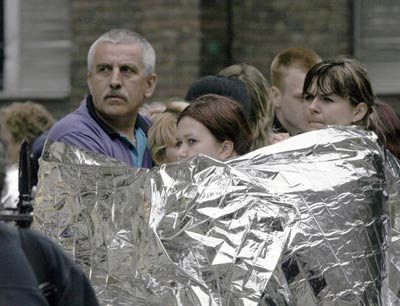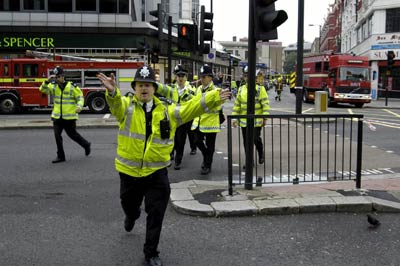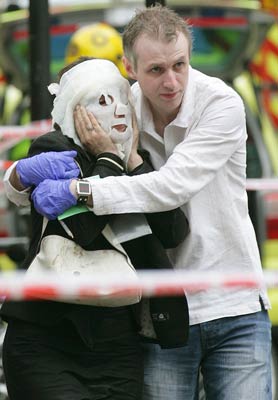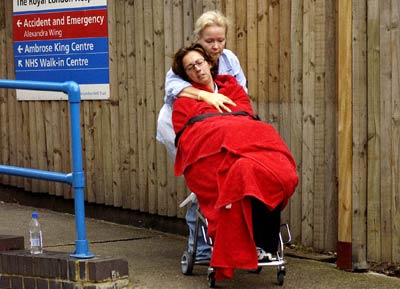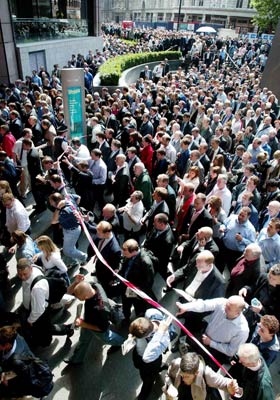About Me
- Name:richard
View my complete profile
Links
- New York Times
- Huffington Post
- Economic Principals
Archives
- 2024-02-13
- 2024-02-20
- 2024-02-27
- 2024-03-06
- 2024-03-13
- 2024-03-20
- 2024-03-27
- 2024-04-03
- 2024-04-10
- 2024-04-17
- 2024-04-24
- 2024-05-01
- 2024-05-08
- 2024-05-15
- 2024-05-22
- 2024-05-29
- 2024-06-05
- 2024-06-12
- 2024-06-19
- 2024-06-26
- 2024-07-03
- 2024-07-10
- 2024-07-17
- 2024-07-24
- 2024-07-31
- 2024-08-07
- 2024-08-14
- 2024-08-21
- 2024-08-28
- 2024-09-04
- 2024-09-11
- 2024-09-18
- 2024-09-25
- 2024-10-02
- 2024-10-09
- 2024-10-16
Politics, Media, Academia, Pop Culture, and More
Friday, July 08, 2024
Chronicles in Greed
Morgan Stanley is giving fired executive Phillip J. Purcell a golden parachute of $113 million.
The mind boggles.
This is a man who, in his short tenure as chief executive of Morgan Stanley, was a complete disaster—so much so that he had to be fired lest every other executive at the firm quit.
One wonders what he would have been paid if he'd been even reasonably competent.
But one doesn't have to wonder why Morgan Stanley announced this late on a Thursday afternoon after a terrorist attack.... The firm clearly hopes no one will notice. Let's hope they're wrong.
The mind boggles.
This is a man who, in his short tenure as chief executive of Morgan Stanley, was a complete disaster—so much so that he had to be fired lest every other executive at the firm quit.
One wonders what he would have been paid if he'd been even reasonably competent.
But one doesn't have to wonder why Morgan Stanley announced this late on a Thursday afternoon after a terrorist attack.... The firm clearly hopes no one will notice. Let's hope they're wrong.
It Seemed Like A Good Idea at the Time
I'm off to a family reunion—the Bradley side—so the posts will be erratic for the next couple of days, and if I seem traumatized when I return, you'll understand why. I have a wonderful family, but reunions are a risky business....
Perhaps I should ask the Re-Ethicist about this....
Perhaps I should ask the Re-Ethicist about this....
The Bombing and the Olympics
You can't help but wonder if the two were related; if the murderers in London weren't trying to send a particularly horrific message to England that, so soon after its great joy, they could bring great terror.
If so, you have to also think that they've terribly miscalculated. They haven't just attacked London now; they've attacked an Olympic city, and in that sense they have attacked the world.
Sometimes, as with 9/11, you think, These bastards combine deep cunning with total nihilism, and what a terrifying combination that is.
Other times....
Yesterday's attack is tragic and appalling, of course. But if the terrorists were trying to achieve some strategic objective, the bombings were just stupid. They accomplish only one thing: to drive home just how isolated and out of touch with the world these terrorists are.
We in the U.S. feel a special kinship with England, certainly. But London is now playing host to the world. I have a feeling that even from the terrorists' warped point of view, this bombing is going to be a serious mistake.....
If so, you have to also think that they've terribly miscalculated. They haven't just attacked London now; they've attacked an Olympic city, and in that sense they have attacked the world.
Sometimes, as with 9/11, you think, These bastards combine deep cunning with total nihilism, and what a terrifying combination that is.
Other times....
Yesterday's attack is tragic and appalling, of course. But if the terrorists were trying to achieve some strategic objective, the bombings were just stupid. They accomplish only one thing: to drive home just how isolated and out of touch with the world these terrorists are.
We in the U.S. feel a special kinship with England, certainly. But London is now playing host to the world. I have a feeling that even from the terrorists' warped point of view, this bombing is going to be a serious mistake.....
What It Was Like (Scroll Way Down Due to Technical Difficulties)
With Thanks to the Times of London....
var totalImages = 19; var imageShowing = 1; var layerRef=""; var styleSwitch=""; function img(mode, imgName) { if (document.images) { document[imgName].src = eval(imgName + mode + ".src"); } } lefton = new Image(); lefton.src = "http://images.thetimes.co.uk/images/left_red.gif"; leftoff = new Image(); leftoff.src = "http://images.thetimes.co.uk/images/left_blue.gif"; righton = new Image(); righton.src = "http://images.thetimes.co.uk/images/right_red.gif"; rightoff = new Image(); rightoff.src = "http://images.thetimes.co.uk/images/right_blue.gif"; function init(){ if (navigator.appName == 'Netscape' && (navigator.userAgent).indexOf("Firefox")==-1){ layerRef = 'document.layers'; styleSwitch = ''; Lshow = 'show'; Lhide = 'hide'; } else { layerRef = 'document.all'; styleSwitch = '.style'; Lshow = 'visible'; Lhide = 'hidden'; } showLayer('image1'); } function showNextLayer(){ var showThisImage = imageShowing + 1; if (showThisImage > totalImages){ showThisImage = 1; } hideLayer(eval('"image' + imageShowing + '"')); showLayer(eval('"image' + showThisImage + '"')); imageShowing = showThisImage; } function showPreviousLayer(){ var showThisImage = imageShowing - 1; if (showThisImage < showthisimage =" totalImages;" imageshowing =" showThisImage;" visibility="' + Lhide + '" visibility="' + Lshow + '" imageshowing =" imageNo;">
Youth Movement
I was out at the Stadium last night to watch as the Yankees obliterated the Indians, 7-2. It was a little eerie: there were lots more police cars than usual, or so it seemed, and I was reminded of going to Yankee Stadium not long after September 11th... The game was preceded by a moment of silence in honor of the British dead and wounded. Unlike the rote playing of "God Bless America" that now takes place every game, this had the feel of authenticity. Somehow the idea of London being attacked particularly wounds the heart...and riles the spirit.
The game itself was terrific. Mike Mussina held the Indians to two runs in seven innings; A-Rod, Jason Giambi, and Derek Jeter all homered; and the Yankees started a rookie, Melky Cabrera, in centerfield. When Cabrera singled his second time up, the crowd of 52,000 gave him a standing ovation. Sweet.
The Yankees now have three promoted minor-leaguers playing regularly on the team: Cabrera, second baseman Robinson Cano, and pitcher Chien Mien-Wang. (Someone check my spelling on that.) I love it. Somehow it's so much easier to root for these young athletes when expectations are low and you know they're just learning the game...and when they're not getting paid $15 million a year.
Consider the Yankees' pitching staff at the start of the season: Randy Johnson, Jaret Wright, Mike Mussina, Kevin Brown, and Carl Pavano. Free-agent signings all. While Mussina's been solid, if not great, Johnson has been inconsistent and generally not very impressive. Wright, Pavano, and Brown are all on the disabled list. After last year's ALCS Game Seven, Kevin Brown may be the most hated Yankee ever; you might as well have taken $30 million and set it on fire....
Who knows whether the rookies will be good enough to spark this team? That's okay. I'd rather watch Melky Cabrera play his heart out and struggle than watch Kevin Brown mail it in and cash his checks....
Oh, and by the way, Dan Shaughnessy: it's 3 1/2 games now....
The game itself was terrific. Mike Mussina held the Indians to two runs in seven innings; A-Rod, Jason Giambi, and Derek Jeter all homered; and the Yankees started a rookie, Melky Cabrera, in centerfield. When Cabrera singled his second time up, the crowd of 52,000 gave him a standing ovation. Sweet.
The Yankees now have three promoted minor-leaguers playing regularly on the team: Cabrera, second baseman Robinson Cano, and pitcher Chien Mien-Wang. (Someone check my spelling on that.) I love it. Somehow it's so much easier to root for these young athletes when expectations are low and you know they're just learning the game...and when they're not getting paid $15 million a year.
Consider the Yankees' pitching staff at the start of the season: Randy Johnson, Jaret Wright, Mike Mussina, Kevin Brown, and Carl Pavano. Free-agent signings all. While Mussina's been solid, if not great, Johnson has been inconsistent and generally not very impressive. Wright, Pavano, and Brown are all on the disabled list. After last year's ALCS Game Seven, Kevin Brown may be the most hated Yankee ever; you might as well have taken $30 million and set it on fire....
Who knows whether the rookies will be good enough to spark this team? That's okay. I'd rather watch Melky Cabrera play his heart out and struggle than watch Kevin Brown mail it in and cash his checks....
Oh, and by the way, Dan Shaughnessy: it's 3 1/2 games now....
Thursday, July 07, 2024
Barbaric
Three Cheers for Judith Miller
Lord knows, it's easy to fault Judith Miller's reporting during the lead-up to the war in Iraq, as Harry Shearer does so passionately. As Michael Massing showed in the New York Review of Books, of all the bad reporting during that time, Miller's was probably the worst—and, unfortunately, it was as influential as it was bad.
But does that mean progressives and First Amendment advocates should now abandon her as she sits in jail for refusing to disclose her source? Is it really fair to ask, as Shearer does, "Is there such a thing as karma? If so, Judith Miller is in the pokey as punishment for helping to get over 1700 Americans and thousands of Iraqis killed for a reason yet to be determined."
These are tough times for journalists. The media's credibility is lower than at any point since perhaps the turn of the last century, and not because it's doing a worse job than usual, but because it's the target of sustained political attacks from both sides of the ideological spectrum...and because any press exposed to the blogosphere, at any time in history, would have its failings glaringly exposed. It's just that never before have so many media critics been able to disseminate their criticisms, and predictably, the media's image has suffered.
In that context, it's inspiring to see a journalist remind the public of how seriously we take our craft. There's lots of discussion now about what constitutes a journalist: Are bloggers journalists? Are talking heads? Is Bill O'Reilly a journalist? What about Armstrong Williams?
That discussion is fostered by the fact that, unlike law and medicine—or even, in my state, hairdressers—American journalism has never been a licensed guild, but an open profession. I think that's one of the great things about the free press in this country, but it does lead to frequent confusion about just exactly what a journalist is.
Well, Judith Miller is currently suggesting one definition: journalists are people who play by the longstanding rules of the profession and live with the consequences.
(Bob Woodward, in protecting Deep Throat's identity for decades, serves up the same lesson.)
How many bloggers would do the same? How many pundits? As Lawrence O'Donnell himself admitted, he didn't write his big scoop about Karl Rove's alleged role in the leak of Valerie Plame's name because he didn't want to get "dragged" before a grand jury. This despite the fact that he'd had his information "for months."
In an eloquent editorial this morning, the Times reminds us why this fight is so important. And in a refreshing bit of honesty, the paper notes:
"To be frank, this is far from an ideal case. We would not have wanted our reporter to give up her liberty over a situation whose details are so complicated and muddy. But history is very seldom kind enough to provide the ideal venue for a principled stand. Ms. Miller is going to jail over an article that she never wrote, yet she has been unwavering in her determination to protect the people with whom she had spoken on the promise of confidentiality."
Another thing that makes this far from an ideal case, of course, is that the reporter involved is one whose work is hotly contested.
No matter. As the Times concludes, "What is at stake is nothing less than our society's perpetual bottom line: the citizens control the government in a democracy. We stand with Ms. Miller and thank her for taking on that fight for the rest of us."
Indeed. Judith Miller may be an imperfect hero, but in this fight, she's still a hero.
But does that mean progressives and First Amendment advocates should now abandon her as she sits in jail for refusing to disclose her source? Is it really fair to ask, as Shearer does, "Is there such a thing as karma? If so, Judith Miller is in the pokey as punishment for helping to get over 1700 Americans and thousands of Iraqis killed for a reason yet to be determined."
These are tough times for journalists. The media's credibility is lower than at any point since perhaps the turn of the last century, and not because it's doing a worse job than usual, but because it's the target of sustained political attacks from both sides of the ideological spectrum...and because any press exposed to the blogosphere, at any time in history, would have its failings glaringly exposed. It's just that never before have so many media critics been able to disseminate their criticisms, and predictably, the media's image has suffered.
In that context, it's inspiring to see a journalist remind the public of how seriously we take our craft. There's lots of discussion now about what constitutes a journalist: Are bloggers journalists? Are talking heads? Is Bill O'Reilly a journalist? What about Armstrong Williams?
That discussion is fostered by the fact that, unlike law and medicine—or even, in my state, hairdressers—American journalism has never been a licensed guild, but an open profession. I think that's one of the great things about the free press in this country, but it does lead to frequent confusion about just exactly what a journalist is.
Well, Judith Miller is currently suggesting one definition: journalists are people who play by the longstanding rules of the profession and live with the consequences.
(Bob Woodward, in protecting Deep Throat's identity for decades, serves up the same lesson.)
How many bloggers would do the same? How many pundits? As Lawrence O'Donnell himself admitted, he didn't write his big scoop about Karl Rove's alleged role in the leak of Valerie Plame's name because he didn't want to get "dragged" before a grand jury. This despite the fact that he'd had his information "for months."
In an eloquent editorial this morning, the Times reminds us why this fight is so important. And in a refreshing bit of honesty, the paper notes:
"To be frank, this is far from an ideal case. We would not have wanted our reporter to give up her liberty over a situation whose details are so complicated and muddy. But history is very seldom kind enough to provide the ideal venue for a principled stand. Ms. Miller is going to jail over an article that she never wrote, yet she has been unwavering in her determination to protect the people with whom she had spoken on the promise of confidentiality."
Another thing that makes this far from an ideal case, of course, is that the reporter involved is one whose work is hotly contested.
No matter. As the Times concludes, "What is at stake is nothing less than our society's perpetual bottom line: the citizens control the government in a democracy. We stand with Ms. Miller and thank her for taking on that fight for the rest of us."
Indeed. Judith Miller may be an imperfect hero, but in this fight, she's still a hero.
Ivy League Secrets
Readers of Harvard Rules will note that one of the book's themes is that, although ostensibly a university committed to open minds, free speech, and veritas, Harvard often prefers secrecy. Try to find out what its Corporation discusses...where its grant money comes from...how its grant money gets spent...try to get an honest answer from its press office, or from one of the countless press secretaries scattered around the university. You won't. At least, not without a hell of a lot of digging.
Now David Burdick, a columnist for the Daily Pennsylvanian, points out that this penchant for secrecy isn't limited to Harvard, but crops up elsewhere in the Ivy League, particularly the Council of Ivy League Presidents.
In a very smart column, Burdick writes about the council's annual meeting, and the fact that the eight presidents involved refuse to say a word about what was discussed. He's particularly concerned about athletic policy, where there are a number of pressing issues (that I'm not very familiar with).
My favorite section:
<
Ironically, it would be hard to find a group as well-versed in open debate of ideas as the Ivy presidents.
Columbia president Lee Bollinger has written an entire book about "free speech in the modern era."
James Wright, the president of Dartmouth, wrote a 300-plus page book on political dissent -- and that only focused on dissent in late 19th Century Colorado.
Who could forget Harvard president Lawrence Summers, who has taken more heat than anyone this year for his public debate of controversial ideas?
And of course there's Gutmann, who seems to make sure that the word democracy appears in the title of everything she writes.>>
It's a classic story: thinkers who promote openness until they actually come to power, when they decide that the free flow of information is, well, a pain in the ass....
Now David Burdick, a columnist for the Daily Pennsylvanian, points out that this penchant for secrecy isn't limited to Harvard, but crops up elsewhere in the Ivy League, particularly the Council of Ivy League Presidents.
In a very smart column, Burdick writes about the council's annual meeting, and the fact that the eight presidents involved refuse to say a word about what was discussed. He's particularly concerned about athletic policy, where there are a number of pressing issues (that I'm not very familiar with).
My favorite section:
<
Ironically, it would be hard to find a group as well-versed in open debate of ideas as the Ivy presidents.
Columbia president Lee Bollinger has written an entire book about "free speech in the modern era."
James Wright, the president of Dartmouth, wrote a 300-plus page book on political dissent -- and that only focused on dissent in late 19th Century Colorado.
Who could forget Harvard president Lawrence Summers, who has taken more heat than anyone this year for his public debate of controversial ideas?
And of course there's Gutmann, who seems to make sure that the word democracy appears in the title of everything she writes.>>
It's a classic story: thinkers who promote openness until they actually come to power, when they decide that the free flow of information is, well, a pain in the ass....
Wednesday, July 06, 2024
Go Yankees!
The Yanks whomped the O's, 12-3, last night, in a game that contained all sorts of good omens. My favorite underdog, Jason Giambi, hit his third homer in the past two days, and struggling pitcher Randy Johnson pitched great on three days rest. The Yanks are 1/2 a game behind the Orioles, four behind the Sox.
In the classic football film, The Replacements, Gene Hackman is asked by a TV reporter what his team needs to come back from a halftime deficit. "Heart," he says. "We gotta have heart." (Whereupon Keanu Reeves suits up for the second half and wins the game.)
The Yanks have enough talent to win it all. They just need to show some heart. Finally, it looks like they are.
And wouldn't it be great if the Yankees came back to win the division after Boston Globe columnist Dan Shaughnessy flat-out declared that that the Sox would win it going away? "Come late September, this is going to look like Secretariat at the Belmont in 1973," Shaughnessy wrote about four days ago.
''We're going to the Series, boys!" shouted Kevin Millar in the locker room after the Sox beat the Phillies the other day. "The fucking Sox are on a roll!"
Getting a little ahead of yourselves, aren't you, boys?
How incredibly great would it be the Sox pulled a catastrophic fold and didn't even make the playoffs? Oh pleaseGodpleaseGodpleaseGod let it happen....
In the classic football film, The Replacements, Gene Hackman is asked by a TV reporter what his team needs to come back from a halftime deficit. "Heart," he says. "We gotta have heart." (Whereupon Keanu Reeves suits up for the second half and wins the game.)
The Yanks have enough talent to win it all. They just need to show some heart. Finally, it looks like they are.
And wouldn't it be great if the Yankees came back to win the division after Boston Globe columnist Dan Shaughnessy flat-out declared that that the Sox would win it going away? "Come late September, this is going to look like Secretariat at the Belmont in 1973," Shaughnessy wrote about four days ago.
''We're going to the Series, boys!" shouted Kevin Millar in the locker room after the Sox beat the Phillies the other day. "The fucking Sox are on a roll!"
Getting a little ahead of yourselves, aren't you, boys?
How incredibly great would it be the Sox pulled a catastrophic fold and didn't even make the playoffs? Oh pleaseGodpleaseGodpleaseGod let it happen....
Keeping Rove on the Hot Seat
Over at the Huffington Post, Lawrence O'Donnell is pretty convinced that Karl Rove's lawyer, Robert Luskin, is full of it. He thinks that Luskin is using lawyerly language to suggest that Rove had nothing to do with the disclosure of Valerie Plame's identity—saying, for example, that Rove never "knowingly disclosed classified information."
Couple of things...
One, I'm enjoying watching O'Donnell keep the heat on, but where has he been for the past year or so? O'Donnell says he's only now going public with his information that it was Rove because he didn't want to "dragged" before a grand jury. So, in other words, after other journalists have taken all the heat, O'Donnell gets to enjoy his scoop.
That's not exactly a textbook definition of courage.
Second, how does O'Donnell respond to the Washington Post story discussed below in which Luskin flat-out denies that Rove disclosed Plame's identity? On the HuffPo, he ignores it.....
Oh, one final thing: Why are conservatives so silent on this matter? You know that if it were the Clinton White House involved, they'd be screaming bloody murder. But outing a CIA agent is a scandal regardless of which political party does it. At the very least, it appears to be against the law, and in a larger sense, it may be treasonous.
I'm sure that conservatives are patriots too, and therefore deeply disturbed by the idea that a White House operative may have been responsible. Right? Anyone there?
Couple of things...
One, I'm enjoying watching O'Donnell keep the heat on, but where has he been for the past year or so? O'Donnell says he's only now going public with his information that it was Rove because he didn't want to "dragged" before a grand jury. So, in other words, after other journalists have taken all the heat, O'Donnell gets to enjoy his scoop.
That's not exactly a textbook definition of courage.
Second, how does O'Donnell respond to the Washington Post story discussed below in which Luskin flat-out denies that Rove disclosed Plame's identity? On the HuffPo, he ignores it.....
Oh, one final thing: Why are conservatives so silent on this matter? You know that if it were the Clinton White House involved, they'd be screaming bloody murder. But outing a CIA agent is a scandal regardless of which political party does it. At the very least, it appears to be against the law, and in a larger sense, it may be treasonous.
I'm sure that conservatives are patriots too, and therefore deeply disturbed by the idea that a White House operative may have been responsible. Right? Anyone there?
Big Business with a Heart
A couple of days ago, a New York teenager was murdered when he resisted a pack of young thugs who wanted to steal his iPod. In the ensuing scuffle, he was stabbed twice in the chest and died.
Yesterday, the boy's father received a telephone call from Steve Jobs, the head of Apple, who wanted to offer his sympathies.
In part because a good friend of mine was just mugged on the subway in Times Square, I'm fascinated and a little moved by this episode. Apple's lawyers and PR people couldn't have recommended that Jobs call the grieving parent; no point in further associating your company with a horrific crime.
So Jobs could only have called because...well, because he has a heart. (If you need anything at all, Jobs reportedly told the boy's father, call me.) That's something we don't expect from our chief executives—and often, in our macho business culture, something we don't even value.
There are, of course, plenty of stories to the effect that Jobs is a megalomaniac and a jerk, at least when it comes to business. But as far as I'm concerned, the man just showed a lot of class.
Yesterday, the boy's father received a telephone call from Steve Jobs, the head of Apple, who wanted to offer his sympathies.
In part because a good friend of mine was just mugged on the subway in Times Square, I'm fascinated and a little moved by this episode. Apple's lawyers and PR people couldn't have recommended that Jobs call the grieving parent; no point in further associating your company with a horrific crime.
So Jobs could only have called because...well, because he has a heart. (If you need anything at all, Jobs reportedly told the boy's father, call me.) That's something we don't expect from our chief executives—and often, in our macho business culture, something we don't even value.
There are, of course, plenty of stories to the effect that Jobs is a megalomaniac and a jerk, at least when it comes to business. But as far as I'm concerned, the man just showed a lot of class.
Tuesday, July 05, 2024
Did Hillary Get a Face-Lift?
Not that there's anything wrong with that. If I were running for president, I might get a face-lift too.
This picture convinces a friend of mine that she did—and of course, right before a trip to Singapore would be the time...
This picture convinces a friend of mine that she did—and of course, right before a trip to Singapore would be the time...
Did I Speak Too Soon?
Karl Rove's lawyer insists that Rove didn't disclose Valerie Plame's identity, but merely spoke to Matt Cooper during the relevant week.
"Karl did nothing wrong. Karl didn't disclose Valerie Plame's identity to Mr. Cooper or anybody else," Robert Luskin told the Washington Post's Carol D. Leonnig. "Luskin said the question remains unanswered: 'Who outed this woman? . . . It wasn't Karl.'"
What are we to make of this? I don't think we should automatically believe it. Rove, after all, is fighting for his career—or at least his White House job—and he surely knows it. He's not under oath, and even if he were, even presidents perjure themselves under oath sometimes. If Cooper's notes don't specifically finger Rove as the leaker, then even if it were Rove, he can deny-deny-deny. In part because Cooper isn't talking....
On the other hand, for Rove simply to lie would be a very big gamble, and I certainly wouldn't assume that.
So...we wait. And in the meantime, I'll do my best not to pre-judge Karl Rove regarding his role in this incident.
"Karl did nothing wrong. Karl didn't disclose Valerie Plame's identity to Mr. Cooper or anybody else," Robert Luskin told the Washington Post's Carol D. Leonnig. "Luskin said the question remains unanswered: 'Who outed this woman? . . . It wasn't Karl.'"
What are we to make of this? I don't think we should automatically believe it. Rove, after all, is fighting for his career—or at least his White House job—and he surely knows it. He's not under oath, and even if he were, even presidents perjure themselves under oath sometimes. If Cooper's notes don't specifically finger Rove as the leaker, then even if it were Rove, he can deny-deny-deny. In part because Cooper isn't talking....
On the other hand, for Rove simply to lie would be a very big gamble, and I certainly wouldn't assume that.
So...we wait. And in the meantime, I'll do my best not to pre-judge Karl Rove regarding his role in this incident.
One Reason Not to Jump Out of a Perfectly Good Plane
Death.
I'm a scuba diver, so I certainly don't begrudge people their high-risk fun. But skydiving? As far as I'm concerned, just flying is risk enough...
I'm a scuba diver, so I certainly don't begrudge people their high-risk fun. But skydiving? As far as I'm concerned, just flying is risk enough...
The Woman at the Center of the Storm
Fascinating article in the Times on the career of Valerie Plame, the CIA agent at the center of the Miller-Cooper affair. She sounds quite impressive. (She does not, however, talk to the Times for the article.)
Couple of things: I'm amused that the CIA is refusing to allow Plame to publish an op-ed. So the White House can disclose her identity, but she can't defend herself?
And two, I wish Republicans would stop attacking Plame and her husband, Joe Wilson, by saying that somehow she "got" him the trip to Niger as a kind of boondoggle. Let's say it's true. Wilson had been an ambassador to two African countries, and had worked under both Republican and Democratic presidents. He wasn't a partisan figure until all this happened—but he was a well-qualified diplomat.
But let's look at the larger picture: Is a fact-finding trip to Niger really such a desirable junket?
Finally, Republicans have insinuated that Plame's secret identity was actually widely known. The Times' piece strongly suggests otherwise....
Couple of things: I'm amused that the CIA is refusing to allow Plame to publish an op-ed. So the White House can disclose her identity, but she can't defend herself?
And two, I wish Republicans would stop attacking Plame and her husband, Joe Wilson, by saying that somehow she "got" him the trip to Niger as a kind of boondoggle. Let's say it's true. Wilson had been an ambassador to two African countries, and had worked under both Republican and Democratic presidents. He wasn't a partisan figure until all this happened—but he was a well-qualified diplomat.
But let's look at the larger picture: Is a fact-finding trip to Niger really such a desirable junket?
Finally, Republicans have insinuated that Plame's secret identity was actually widely known. The Times' piece strongly suggests otherwise....
Sunday, July 03, 2024
Revisiting the Re-Ethicist
This week the columnist known as the Ethicist, also known as Randy Cohen, does not respond to reader mail. (Perhaps it was a quiet week in the Ethicist's mailbox.)
Instead, he quotes a letter written by Thomas Jefferson and ponders pleasantly about that for a while.
The quote is this: "Never suffer a thought to be harbored in your mind which you would not avow openly. When tempted to do anything in secret, ask yourself if you would do it in public. If you would not, be sure it is wrong. "
Possibly I have a dirty mind, but to me, that quote cries out for a little Freudian reading. As in: Well, how would you feel about avowing your lustful thoughts for a slave woman?
The Ethicist avoids this topic, however, as it is the 4th of July tomorrow and the Ethicist, unlike the Re-Ethicist, prefers not to make waves.
He does mention slavery, however--it would be awkward not to-- and writes, "Jefferson's inability always to heed his own advice makes him not hypocritical but human, and it does not gainsay the wisdom of that advice."
Wrong!
Of course Jefferson's inability to heed his own advice makes him a hypocrite. And all the more human for it. After all, Jefferson's primary reason for not freeing his slaves was economic; he was a terrible businessman and constantly in need of money, and he simply couldn't afford to free his slaves and live in the style to which he was accustomed.
What we must take from Jefferson instead is the fact that, even if he was not always strong enough to do the right thing, he knew what the right thing was, and he wrote words that inspired generations to come to make better choices than he did. Jefferson is fascinating because he is so human. A hypocrite, yes. But surely we are all hypocrites about some thing or other; one can not dismiss a person's life and work because of hypocrisy. Jefferson's value comes from the fact that he helped to create the rhetoric and the idea of freedom for all people, and it is for these enduring accomplishments, rather than his personal failings, that we should remember him.
If you disagree, take a visit to the Jefferson Memorial in Washington, something I try to do whenever I visit that city. The words on that monument leave me with a feeling of immense humility, and usually get me a little choked-up. In some lives, it is actions rather than words that matter most. In Jefferson's, it is the words that matter.
Instead, he quotes a letter written by Thomas Jefferson and ponders pleasantly about that for a while.
The quote is this: "Never suffer a thought to be harbored in your mind which you would not avow openly. When tempted to do anything in secret, ask yourself if you would do it in public. If you would not, be sure it is wrong. "
Possibly I have a dirty mind, but to me, that quote cries out for a little Freudian reading. As in: Well, how would you feel about avowing your lustful thoughts for a slave woman?
The Ethicist avoids this topic, however, as it is the 4th of July tomorrow and the Ethicist, unlike the Re-Ethicist, prefers not to make waves.
He does mention slavery, however--it would be awkward not to-- and writes, "Jefferson's inability always to heed his own advice makes him not hypocritical but human, and it does not gainsay the wisdom of that advice."
Wrong!
Of course Jefferson's inability to heed his own advice makes him a hypocrite. And all the more human for it. After all, Jefferson's primary reason for not freeing his slaves was economic; he was a terrible businessman and constantly in need of money, and he simply couldn't afford to free his slaves and live in the style to which he was accustomed.
What we must take from Jefferson instead is the fact that, even if he was not always strong enough to do the right thing, he knew what the right thing was, and he wrote words that inspired generations to come to make better choices than he did. Jefferson is fascinating because he is so human. A hypocrite, yes. But surely we are all hypocrites about some thing or other; one can not dismiss a person's life and work because of hypocrisy. Jefferson's value comes from the fact that he helped to create the rhetoric and the idea of freedom for all people, and it is for these enduring accomplishments, rather than his personal failings, that we should remember him.
If you disagree, take a visit to the Jefferson Memorial in Washington, something I try to do whenever I visit that city. The words on that monument leave me with a feeling of immense humility, and usually get me a little choked-up. In some lives, it is actions rather than words that matter most. In Jefferson's, it is the words that matter.
Karl Rove, Traitor?
All right, so my civility didn't make it through the 4th of July weekend.
But the news that Karl Rove was probably the source of the leak that Valerie Plame was a CIA agent is huge. Now we know that the president's right-hand man told at least one reporter of the identity of an undercover CIA agent, very possibly breaking the law.
What, I wonder, would conservatives say had this episode happened in the Clinton White House?
Well, they probably would have said that the perpetrator was, um, a traitor; that it was typical of how Democrats don't love America; and they'd call for his firing, at the very least, and probably his prosecution.
Is turnabout fair play? Well, yes and no. On the one hand, the White House deserves it, and Rove certainly does, what with his talk about how Democrats want to put terrorists in therapy.
On the other hand, the Democrats shouldn't hit below the belt just because some conservatives would. It'd be unfair to say that Rove's treason--because, yes, that really is what it is--says anything in general about this White House or the Republican Party.
But it does seem to me that it becomes very tricky for the White House to maintain in its employ a man who deliberately disclosed the covert identity of a CIA agent in order to discredit a political opponent who happened to be that agent's spouse.
The question is, Will the White House do the right thing and fire Rove?
And close on its heels: How could the president not have known that Rove was the leaker? After all, President Bush announced that he was calling for an internal review of the episode long ago, and called for the people involved to reveal themselves.... So hasn't Karl Rove, at least in theory, been disobeying the president for many months now?
But the news that Karl Rove was probably the source of the leak that Valerie Plame was a CIA agent is huge. Now we know that the president's right-hand man told at least one reporter of the identity of an undercover CIA agent, very possibly breaking the law.
What, I wonder, would conservatives say had this episode happened in the Clinton White House?
Well, they probably would have said that the perpetrator was, um, a traitor; that it was typical of how Democrats don't love America; and they'd call for his firing, at the very least, and probably his prosecution.
Is turnabout fair play? Well, yes and no. On the one hand, the White House deserves it, and Rove certainly does, what with his talk about how Democrats want to put terrorists in therapy.
On the other hand, the Democrats shouldn't hit below the belt just because some conservatives would. It'd be unfair to say that Rove's treason--because, yes, that really is what it is--says anything in general about this White House or the Republican Party.
But it does seem to me that it becomes very tricky for the White House to maintain in its employ a man who deliberately disclosed the covert identity of a CIA agent in order to discredit a political opponent who happened to be that agent's spouse.
The question is, Will the White House do the right thing and fire Rove?
And close on its heels: How could the president not have known that Rove was the leaker? After all, President Bush announced that he was calling for an internal review of the episode long ago, and called for the people involved to reveal themselves.... So hasn't Karl Rove, at least in theory, been disobeying the president for many months now?
![]()



